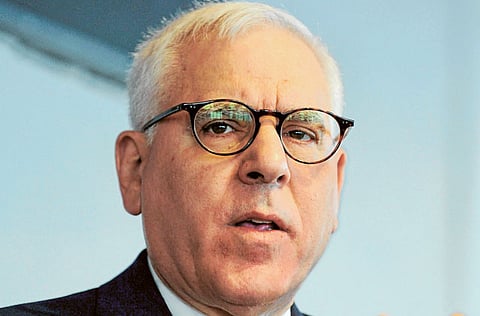Wall Street’s system of justice a sham
Finra gets almost $1 billion (Dh3.67 billion) a year from Wall Street

So, let's get this straight. It's perfectly fine for investors and financial-firm employees who have a dispute with Wall Street to be forced into an arbitration process administered by the Financial Industry Regulatory Authority, Wall Street's self-regulatory organisation.
Yet, when the Carlyle Group, a private-equity firm seeking to sell its shares to the public, tried to require its new investors to use that same process to resolve any potential disputes, the powers that be called foul. The Securities and Exchange Commission (SEC) even threatened to block the initial public offering unless an arbitration requirement was removed from its registration documents.
So there is the question: How can a forced-arbitration process be acceptable for the millions of people who do business with or work on Wall Street and then be deemed unacceptable for people who choose to buy stock in Carlyle?
The answer, of course, is the Wall Street arbitration process is not the least bit fair — for anyone, including financial workers and Carlyle's potential investors. What the Carlyle incident shows definitively is that financial firms' kangaroo-court system — Finra gets almost $1 billion (Dh3.67 billion) a year from Wall Street — must be ended, allowing those with disputes to use the judicial system like everyone else.
Rejected
Here's what happened with Carlyle: In its original S-1 registration statement, the Washington-based private-equity behemoth included a provision that would have required all of its new shareholders to resolve disputes with Carlyle in arbitration, rather than via the court system. Carlyle was probably hoping to pull a fast one, since the idea of forcing shareholders into arbitration had been rejected as long ago as 1990.
It was the SEC — which has as one of its chief responsibilities the obligation to watch out for investors — that rejected that 1990 attempt, and no issuer had tried to do it again until Carlyle came along. "SEC staff found the provision would deprive shareholders of access to a judicial forum, restricting plaintiffs' ability to recover for serious violations of the law," three Democratic US senators wrote to Mary Schapiro, the SEC chairman, in a February 3 letter urging her to fight the provision in the Carlyle filing.
The three Senators argued further that "requiring shareholders to forgo litigation and instead settle disputes in individual, confidential arbitration — as proposed by Carlyle Group" would "deprive investors of important, congressionally-established rights." Faced with the ire of the three senators, as well as pressure from institutional investors and advocacy groups, the SEC told Carlyle that its S-1 would not be approved as long as the forced arbitration provision remained.
Caved in
Carlyle quickly caved in. "After consultations with the SEC, Carlyle investors and other interested parties, we have decided to withdraw the proposed arbitration provision," Chris Ullman, a Carlyle spokesman, said in a statement. "We first offered the provision because we believed that arbitrating claims would be more efficient, cost effective and beneficial to our unitholders."
Individual-rights advocates, good-government types and the class-action bar all hailed the coalition of investors, regulators and lawmakers that forced Carlyle's hand. "With the investor community, lawmakers, and former SEC officials speaking out against the use of forced arbitration in Carlyle's proposed IPO, it was evident that this was an ill-conceived move from the start," Gary M. Paul, the president of the American Association for Justice, told the New York Times. "Today's developments should send a strong signal to other companies that forced arbitration clauses will not be accepted by investors or the SEC."
That's fine. But where is this same sense of outrage and injustice for the millions of people (including myself, once) forced into the Finra-administered arbitration process? Why haven't the three senators gone to bat for them? Why hasn't Schapiro taken the obvious next step and looked into banning forced arbitration across the financial world? (Note: Before becoming the SEC chairman, Schapiro was the top executive of Finra, which gave her $9 million as a parting gift.)
If forced arbitration is no good for potential investors in Carlyle's IPO, it's no good for the rest of us who have our savings or careers tied in with Wall Street. The right to have disputes adjudicated in a court of law is one of America's foundations. So why do we allow it to be taken away by a Wall Street cartel eager to control the levers of justice?
William D. Cohan, a former investment banker, is the author of Money and Power: How Goldman Sachs Came to Rule the World.



